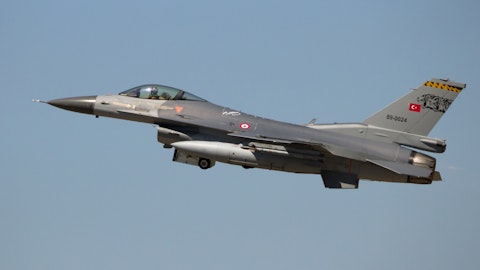Richard Safran: Okay, thank you.
Kathy Warden: Thank you.
Operator: Thank you one moment for questions. Our next question comes from Ron Epstein with Bank of America Merrill Lynch. You may proceed.
Ron Epstein: Yes. Hey, good morning, everybody. I guess I have to dig down a little bit further on that with that no bid, also crossover to FAXX? Or do you — at a related program or a different program? How should we think about that? Or is that when you want to be a supplier on as well?
Kathy Warden: Well, I’ll just say that, when I noted we have other opportunities we are pursuing. I won’t disclose at this point exactly what those are a little more information comes out on other programs. But you could assume that if we feel we’re well positioned, and the government is appropriately balancing risk and reward as I said that that would be a program we would pursue.
Ron Epstein: Got it? Got it. Got it. Got it. Okay, cool. Thank you.
Operator: Thank you. One moment for questions. Our next question comes from Kristine Liwag with Morgan Stanley, you may proceed.
Kristine Liwag: Hey, good morning, guys. And maybe following back up on those two questions, I mean, not bidding as a [prime] and NGAD. Kathy, is this part of your strategy in terms of maintaining, margin growth in the next few years? Because, we look at historically you guys had walked away from T-7, you’d walk away from the [tanker], and avoided the Winner’s Curse. Is that how to think about the strategy for this program? Or are there other factors in play that we should consider?
Kathy Warden: Oh, Kristine, certainly your words, not mine. But we do feel that discipline has served us well in the past and selecting how much risk to take and what to pursue. And we’ve learned lessons from some of our own experience as well. So we are applying those as we think about what to bid and what not to bid going forward. And that is critical to us, expanding our margins back to what investors expect of this company. And it’s the three factors I mentioned. But the discipline, and ensuring we have the right combination of risk reward is important. And it’s not just important for us to be able to meet our commitments to investors, but for the entire industrial base to remain healthy, so that we can have industrial base that investors want to invest in.
Kristine Liwag: Great, thank you. I’ll keep it to one.
Kathy Warden: Thanks, Kristine.
Operator: Thank you, one moment for questions. Our next question comes from Doug Harned with Bernstein. You may proceed.
Doug Harned: Good morning. Thank you. On the margin question, even when we look at history, generally inflation, it doesn’t affect defense companies that much. And we’ve obviously seen a very difficult two years where it rose, and you’ve talked about this rose very quickly, and you’ve had to absorb costs and fixed price contracts. When you look forward. You talked about being able to run out some of the contracts that were priced before we had that higher inflation level. But when you look at repricing contracts that go into next tranches, new work, do you expect that you’re going to be able to get back to be able to price off a base cost level that could allow you to have the same kind of performance we saw in the sense in the pre COVID era?
Kathy Warden: Yes, Doug, we do expect that to be the case, the government will look at the actual that we have experienced and the inflationary pressures are absolutely showing up not only in labor but material which then provide us the basis to work with the government and negotiate half of those hire, half in the future contract.





